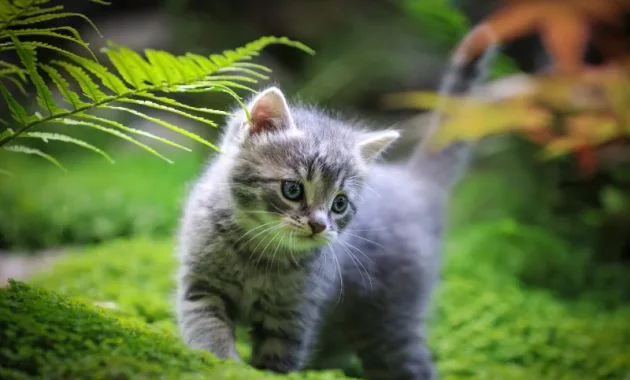Asparagus fern is a popular and attractive plant that many people enjoy having in their homes. However, if you are a cat owner, it is essential to understand the potential dangers that asparagus fern can pose to your feline friend.
The answer to the question, “is asparagus fern toxic to cats?” is a resounding yes. Asparagus fern contains toxic chemicals that can be harmful to cats if ingested. These chemicals are known to cause a range of symptoms and health complications, which can be severe in some cases.
In this article, we will provide a comprehensive guide to asparagus fern toxicity in cats. We will discuss the specific dangers and risks associated with cats ingesting asparagus fern, as well as the symptoms of asparagus fern poisoning and the appropriate treatment options. Additionally, we will highlight practical tips on how to prevent asparagus fern poisoning in cats and suggest safe alternatives for cat owners who still want to incorporate greenery into their homes.
Understanding the Toxicity of Asparagus Fern for Cats
Asparagus fern, also known as emerald fern or lace fern, is a popular houseplant known for its delicate, feathery foliage. While it may be a beautiful addition to any home, cat owners should be aware of the potential dangers it poses to their feline companions.
Asparagus fern contains sapogenins, which are toxic to cats and can cause a range of health complications when ingested. These toxic compounds can cause vomiting, diarrhea, and abdominal pain. In severe cases, asparagus fern poisoning can lead to dehydration, difficulty breathing, and even death.
“Asparagus fern contains sapogenins, which are toxic to cats and can cause a range of health complications when ingested.”
In addition to gastrointestinal symptoms, asparagus fern poisoning can also cause skin irritation and redness if the plant’s sap comes into contact with a cat’s skin. Cat owners should therefore exercise caution when handling the plant and ensure that it is kept out of reach of their pets.
If a cat has ingested asparagus fern, it is important to seek veterinary assistance immediately. The veterinarian may induce vomiting to remove any remaining plant material from the cat’s system, or administer medication to relieve symptoms and prevent further health complications.
In summary, cat owners should be aware of the potential dangers that asparagus fern poses to their feline companions. While it may be a beautiful plant to have in the home, it is important to exercise caution and take steps to prevent asparagus fern poisoning in cats.
Recognizing the Symptoms of Asparagus Fern Poisoning in Cats
It’s important for cat owners to be vigilant and aware of the symptoms their feline companions may display if they have ingested asparagus fern. While not all cats will have negative reactions, those that do may experience a range of symptoms that can indicate toxicity.
Some common symptoms of asparagus fern poisoning in cats include:
- Vomiting
- Diarrhea
- Lethargy
- Loss of appetite
- Difficulty breathing
- Seizures
- Abnormal heart rate or rhythm
If you suspect your cat has ingested asparagus fern and is showing any of these symptoms, it’s important to seek veterinary assistance immediately. Early diagnosis and treatment can make a significant difference in minimizing the potential health risks for your cat.
Remember, asparagus fern can be highly toxic to cats and should be kept out of reach at all times. Being aware of the symptoms of poisoning and seeking prompt veterinary care can help ensure your pet’s safety and wellbeing.

Treating Asparagus Fern Toxicity in Cats
If a cat ingests asparagus fern and is showing signs of toxicity, prompt treatment is crucial. Cat owners should seek veterinary assistance immediately to ensure their pet receives the necessary medical attention.
The treatment for asparagus fern poisoning in cats varies depending on the severity of the toxicity. In less severe cases, the veterinarian may induce vomiting to remove any remaining plant matter from the cat’s stomach. They may also administer activated charcoal to prevent further absorption of toxins into the bloodstream.
In more severe cases, the cat may require hospitalization and intensive treatment. This may involve the administration of intravenous fluids, medications to treat symptoms such as vomiting and diarrhea, and oxygen therapy to assist with breathing difficulties.
It is important for cat owners to follow the veterinarian’s instructions closely and ensure their pet receives any necessary follow-up care. They should also be vigilant in monitoring their cat’s condition and report any changes to the veterinarian immediately.
Preventing Asparagus Fern Poisoning in Cats
Asparagus fern can pose a serious risk to the health of cats if ingested. However, there are several precautions that cat owners can take to prevent asparagus fern poisoning in their feline companions.
Create a Safe Environment for Your Cat
One of the most effective ways to prevent asparagus fern poisoning in cats is to create a safe environment for them to live in. This includes keeping any plants, including asparagus fern, out of their reach. Make sure to place plants in areas that are inaccessible to your pet, such as on high shelves or in hanging baskets. Additionally, keep your cat’s eating and sleeping areas separate from any plants to avoid accidental ingestion.
Choose Safe Alternatives
If you’re looking to add some greenery to your home, there are many plants and greenery options that are safe for cats to be around. Consider incorporating pet-friendly plants, such as spider plants or catnip, into your living space to beautify your home while keeping your cat safe.
Be Vigilant
Be on the lookout for any potential signs of asparagus fern poisoning in your cat, such as vomiting, diarrhea, and difficulty breathing. If you suspect that your pet may have ingested asparagus fern, seek veterinary assistance immediately.
By taking these precautions, you can help ensure that your feline companion stays safe and healthy while still enjoying a beautiful living space.
Safe Alternatives to Asparagus Fern for Cat Owners
If you’re a cat owner, it’s essential to keep your feline companions safe from any potential hazards in your home. While many plants and greenery can be harmful to cats when ingested, there are still plenty of safe alternatives to consider. Here are some options to add a touch of greenery to your home without compromising your cat’s health:
- Boston Fern: This pet-friendly plant is an excellent alternative to asparagus fern and can help purify the air in your home.
- Spider Plant: Another safe option for cats, this plant is easy to care for and adds a bright pop of green to any room.
- Money Tree: Not only is this plant safe for cats, but it’s also believed to bring good luck and prosperity.
- Calathea: With its unique foliage and low maintenance needs, this plant is a great choice for cat owners who want to add a touch of tropical flair to their home.
It’s crucial to note that even pet-friendly plants can pose a risk to cats if ingested in large quantities. As such, it’s always a good idea to keep an eye on your cats and seek veterinary advice if any concerns arise.
Conclusion
Asparagus fern can be toxic to cats, and it is important for cat owners to be aware of the potential dangers associated with this houseplant. Cats that have ingested asparagus fern may exhibit symptoms such as vomiting, diarrhea, and difficulty breathing. If you suspect that your cat has ingested asparagus fern and is showing signs of toxicity, it is crucial to seek veterinary assistance immediately.
Preventing asparagus fern poisoning in cats can be as simple as keeping the plant out of reach. Additionally, consider incorporating safe alternatives, such as spider plants or bamboo palm, into your home to add a touch of greenery without posing a risk to your feline companion.
Remember to prioritize your cat’s safety and well-being by being informed about potential hazards in your environment. If any concerns arise, consult with a veterinary professional for guidance and support.


